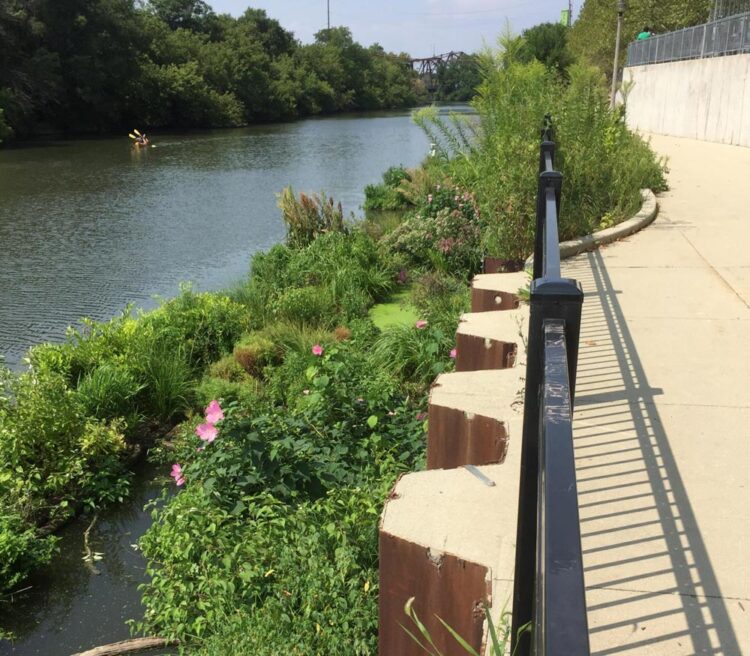Floating gardens: More than just a pretty place

Floating garden in summer.
Credit: Abigail Heath
Research presented at the 2020 GSA Annual Meeting
Floating gardens sound so idyllic. Now, a study proves that they are more than just a pretty place. The study, by researchers at Illinois State University, demonstrates that such constructed gardens can have a measurable, positive impact on water quality.
Floating gardens are essentially rafts built on a frame of plastic caging, wrapped in coconut husks, and filled in with native plantings. As plants grow, they extend their roots into the water, growing hydroponically. On Chicago’s North Branch of the Chicago River, non-profit Urban Rivers and partners are developing a mile-long, floating eco-park. Dubbed the Wild Mile, the re-development of this former industrial canal is Urban Rivers’ flagship project. As part of the park, floating gardens, attached to shore, are being installed.
The primary intent of the floating gardens is beautification. But the Illinois State team, from the University’s Department of Geology, Geography, and the Environment, saw an ideal setup for a controlled experiment. “We got involved because it’s the perfect opportunity to see if there’s an impact on water quality,” explains lead author Abigail Heath.
Heath will present the results of the study in an online talk on Tuesday from 10:45 to 11:00 a.m. EDT, during the Geological Society of America’s annual meeting.
The study is novel: previous studies have explored floating gardens’ impact on water quality over time, primarily in wastewater treatment ponds, but not over space, in moving water. The project also meshes well with Urban Rivers’ broader goals. “The city is interested in water quality,” says Phil Nicodemus, Urban Rivers Director of Research. “Happily, Illinois State got involved.”
Starting in spring 2018, Heath and co-authors have sampled water immediately upstream and downstream of a narrow 3 meter by 50 meter floating garden installed along the shoreline. Samples are collected weekly, at the surface and from 0.3 meters deep, the depth where roots reach from the garden’s base into the water. Although the garden is set at the edge of Chicago’s urban core, water quality is also impacted by upstream agriculture. Analyses are focused on nutrients including nitrate as nitrogen, chloride, sulfate, and phosphate.
Could this small slice of human-made paradise improve water quality? An average of data collected over the course of the study show modest but definitive improvement. For example, nitrate as nitrogen dropped from 4.69 milligrams per liter in surface water just upstream of the garden to 4.43 milligrams per liter just downstream, a drop of about 1 percent. Phosphate was also lower downstream of the garden.
“Despite how small this garden was there was measurable improvement in water quality from upstream to downstream, especially for nitrates,” notes Heath. She and colleagues see this as a scalable model for how larger floating gardens might help remediate water in similar settings. “Even this tiny garden makes a difference,” she says.
###
Contact: Abigail Heath
Illinois State University
Department of Geography, Geology and the Environment
Felmly Hall 206
Campus Box 4400
Normal, Illinois 61790-4400
aheath1@ilstu.edu
Phone (Dr. Eric Peterson): 309-438-7865
FEATURED ABSTRACT:
60-4: Assessment of Floating Gardens to Improve the Water Quality of the Chicago River (10:45 a.m. EDT) https:/
The Geological Society of America, founded in 1888, is a scientific society with over 20,000 members from academia, government, and industry in more than 100 countries. Through its meetings, publications, and programs, GSA enhances the professional growth of its members and promotes the geosciences in the service of humankind. Headquartered in Boulder, Colorado, GSA encourages cooperative research among earth, life, planetary, and social scientists, fosters public dialogue on geoscience issues, and supports all levels of earth-science education.
All latest news from the category: Earth Sciences
Earth Sciences (also referred to as Geosciences), which deals with basic issues surrounding our planet, plays a vital role in the area of energy and raw materials supply.
Earth Sciences comprises subjects such as geology, geography, geological informatics, paleontology, mineralogy, petrography, crystallography, geophysics, geodesy, glaciology, cartography, photogrammetry, meteorology and seismology, early-warning systems, earthquake research and polar research.
Newest articles

Stretchable quantum dot display
Intrinsically stretchable quantum dot-based light-emitting diodes achieved record-breaking performance. A team of South Korean scientists led by Professor KIM Dae-Hyeong of the Center for Nanoparticle Research within the Institute for…

Internet can achieve quantum speed with light saved as sound
Researchers at the University of Copenhagen’s Niels Bohr Institute have developed a new way to create quantum memory: A small drum can store data sent with light in its sonic…

A chip unique in the world
A team from UPV and iPRONICS has manufactured the first universal, programmable and multifunctional photonic chip on the market. A team from the Photonics Research Laboratory (PRL)-iTEAM of the Universitat…




















